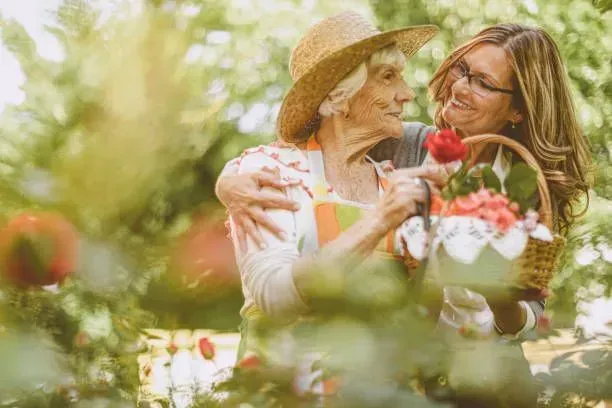Embracing Green Therapy: The Benefits of Gardening for the Elderly
Embracing Green Therapy:
The Benefits of Gardening for the Elderly
At 7 Day Home Care, we believe in the transformative power of gardening for the elderly, recognizing it as more than just a pastime, but a therapeutic activity that offers numerous physical, mental, and emotional benefits. Engaging in gardening helps seniors maintain and improve their physical health by promoting gentle exercise, which enhances mobility, strength, and flexibility. The process of nurturing plants also stimulates cognitive function, providing a natural way to reduce the risks or symptoms of cognitive decline by keeping the mind active and focused. Additionally, gardening offers emotional benefits, such as reducing stress and anxiety, fostering a sense of purpose, and boosting mood through the satisfaction of watching plants grow and thrive. The connection to nature and the opportunity to spend time outdoors further enriches their overall well-being. At 7 Day Home Care, we encourage and support gardening activities as part of our holistic approach to senior care, ensuring that our clients enjoy these wonderful benefits as part of a balanced, healthy lifestyle.

Gardening Can Have a Profound Impact on the
Physical, Mental, and Emotional Well-Being of Seniors
As the sun rises, illuminating the world with its warm embrace, so does the opportunity for the elderly to enrich their lives through gardening. 7 Day Home Care recognizes the profound impact that gardening can have on the physical, mental, and emotional well-being of seniors. This article delves into the myriad benefits of gardening for the elderly. Moreover, we'll share some tips on how to make gardening easier for seniors, helping them relish this rejuvenating activity while aging gracefully.
The Therapeutic Power of Gardening
- Physical Health Benefits: Gardening presents an array of physical advantages for the elderly. According to the Mayo Clinic, regular gardening can significantly improve strength, flexibility, and balance, reducing the risk of falls and injuries. The physical activities involved in gardening, such as digging, weeding, and planting, serve as low-impact exercises that keep joints supple and muscles toned.
- Mental Well-being: Engaging in gardening nurtures a sense of purpose and accomplishment, fostering mental well-being among the elderly. Research from the Cleveland Clinic shows that gardening can alleviate symptoms of depression, anxiety, and stress. The act of caring for plants and watching them flourish helps seniors feel more connected to nature and reduces feelings of loneliness or isolation.
- Cognitive Enhancement: Studies indicate that gardening has cognitive benefits for seniors. The active learning involved in gardening, such as understanding plant care and recognizing different species, enhances memory and cognitive functions. Additionally, the act of planning and organizing a garden stimulates problem-solving skills, keeping the mind sharp and agile.
Tips for Seniors to Enjoy Gardening Safely
- Raised Garden Beds: To make gardening more accessible and comfortable for the elderly, consider using raised garden beds. These elevated structures alleviate the need for bending and kneeling, reducing strain on joints and back muscles.
- Ergonomic Tools: Invest in lightweight, ergonomic gardening tools with easy-to-grip handles. These tools make tasks like pruning, weeding, and planting less strenuous and more enjoyable for seniors.
- Utilize Vertical Gardening: Vertical gardening minimizes the need for constant bending and reaching. Trellises, wall-mounted planters, and hanging baskets are great options for growing plants vertically, saving space and effort.
- Watering Assistance: Set up a convenient watering system, such as drip irrigation or soaker hoses, to make it easier for seniors to keep their plants well-hydrated without the need for constant manual watering.
- Create Seating Areas: Designate cozy seating areas within the garden, providing seniors with comfortable spots to rest and take in the beauty of their creation.
- Adaptive Clothing: Encourage seniors to wear comfortable, breathable clothing while gardening, and suggest adaptive tools like knee pads or gardening gloves to protect their hands and knees.
3 Statistics Supporting Gardening for the Elderly
- According to a study published in the Journal of Aging and Health, seniors who engage in regular gardening experience a 36% reduction in the risk of cognitive decline.
- The National Institutes of Health (NIH) reported that gardening for just 30 minutes daily can help lower blood pressure and reduce the risk of heart disease by 30%.
- A study conducted by the American Society for Horticultural Science showed that gardening can lead to a significant increase in hand strength and dexterity, essential for seniors' everyday tasks.
In the bustling urban landscapes of Manhattan, Brooklyn, Queens, Nassau County, and Suffolk County, New York, gardening offers a sanctuary of tranquility for the elderly. The therapeutic effects of gardening on physical health, mental well-being, and cognitive function are unparalleled, enriching the lives of seniors in immeasurable ways.
7 Day Home Care is dedicated to promoting the well-being of the elderly by embracing the wonders of green therapy. By providing seniors with the necessary resources, tips, and accessible gardening solutions, they can experience the joy and satisfaction of tending to their own gardens. Let us nurture the growth of a happier, healthier, and more vibrant elderly community through the power of gardening. Any time you start a new physical endeavor or exercise program, consult with your doctor or health care professional, as you want to make sure that you are doing it with your health in mind. 7 Day Home Care is licensed by the New York State Department of Health to provide home care services in Manhattan, Queens, Brooklyn, Nassau County, and Suffolk County, New York. To learn more about our home care services, please call 516-408-0034.
Brian Callahan
7 Day Home Care










